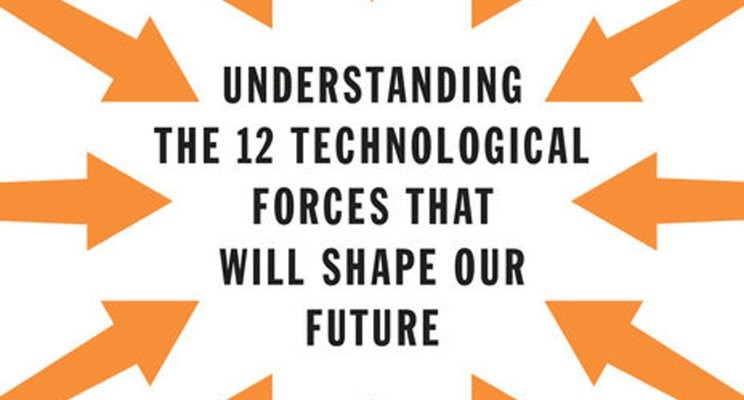Machines are taking our jobs, social media is taking our attention, AI is taking our consciousness… and it’s just the beginning.
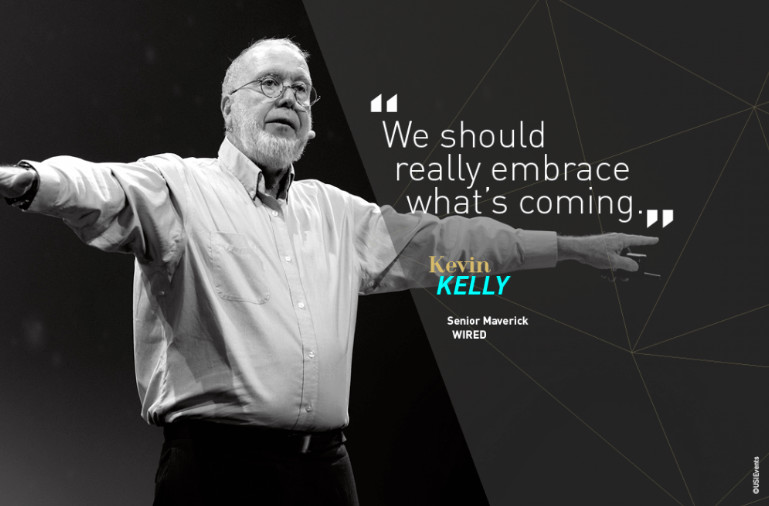 Kevin Kelly, nicknamed “the most interesting man in the world” has his finger on the pulse. As the founding editor of WIRED Magazine he has watched the forefront of technology for the last 30 years and has determined the inevitable technological forces that will continue to drive global innovation over the next 30 years. He’s not wrong. These trends are the best distillation on the internet of what’s coming.
Kevin Kelly, nicknamed “the most interesting man in the world” has his finger on the pulse. As the founding editor of WIRED Magazine he has watched the forefront of technology for the last 30 years and has determined the inevitable technological forces that will continue to drive global innovation over the next 30 years. He’s not wrong. These trends are the best distillation on the internet of what’s coming.
Trying to keep up with all the products that are coming out is futile. There are over a million tech startups in the world. But you can get a good understanding of the general direction of innovation by looking at processes. Processes are now more important than products. Our greatest invention in the past 200 years was the scientific process itself. That’s why Kelly, instead of predicting the future tech products, has identified 12 processes that are already set in motion and are set to continue for at least the next 30 years.
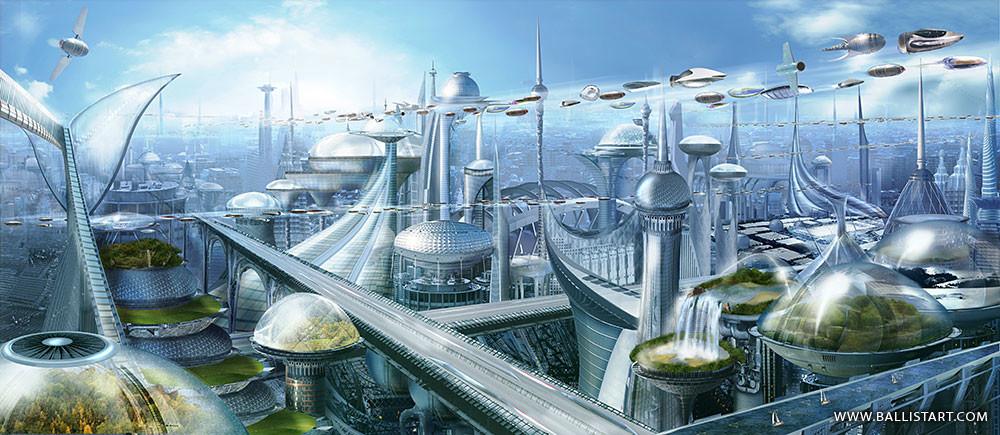 When we think of the future, we often think of sci-fi — crazy megastructures, flying cars, robot maids — but as Kelly points out “in thirty years the city will look like it does now. We will have rearranged the flows, not the atoms. We will have a different idea of what a city is, and who we are, and how we relate to other people.”
When we think of the future, we often think of sci-fi — crazy megastructures, flying cars, robot maids — but as Kelly points out “in thirty years the city will look like it does now. We will have rearranged the flows, not the atoms. We will have a different idea of what a city is, and who we are, and how we relate to other people.”
Kelly provides an optimistic road map, showing how the coming changes can be understood, how we embrace them to maximize the benefits and minimize the damage. We will all need to continually upgrade just to stay in the game.
1 – BECOMING
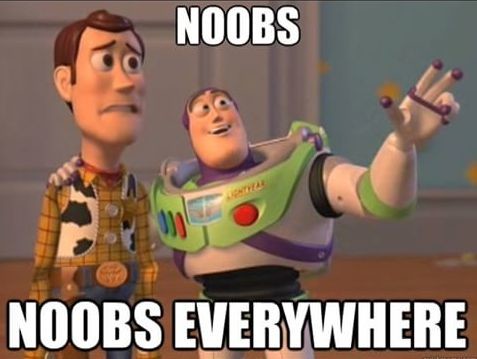 We are moving away from fixed products towards always upgrading services and subscriptions. Our life is becoming a series of endless upgrades, and it’s accelerating. The good news is you are not alone. Everyone is a newbie. The bad news is we will all be newbies forever.
We are moving away from fixed products towards always upgrading services and subscriptions. Our life is becoming a series of endless upgrades, and it’s accelerating. The good news is you are not alone. Everyone is a newbie. The bad news is we will all be newbies forever.
The important technologies that will dominate life 30 years from now have not yet been invented. New technology requires endless upgrades and the cycle of obsolescence is accelerating, so you won’t have time to master anything before it is displaced.
Utopia is dead. A utopia has no problems to solve, but also no opportunities either. We need to think of the our future in terms of “Protopia” — a state of becoming, rather than a destination. It is a process. In a protopian world, things are better today than they were yesterday, though only a bit better. Today’s problems were caused by yesterday’s tech successes, and the tech solutions today will cause the problems of tomorrow.
TIP: Take a moment to time-travel to 2047 and look back at the world in 2017. Can you imagine how amazing it would have been to be an innovator in 2017? It was a wide-open frontier! You could pick almost any category and become the world’s #1 expert. If only you realized how possible everything was back then! Now step back in that time machine. Come back to 2017 and make your 2047 self proud.
2 – COGNIFYING
We are making everything much smarter using cheap powerful AI that we get from the cloud. Applied AI will be available just like electricity was over 100 years ago. It will be embedded in everything.
The top-ranked human chess player today trained with AIs and has been deemed the most computerlike of all human chess players. If AI can help humans become better chess players, it can help us become better athletes, doctors, lawyers, teachers, but only if we adapt to learn to use it, otherwise we become obsolete.
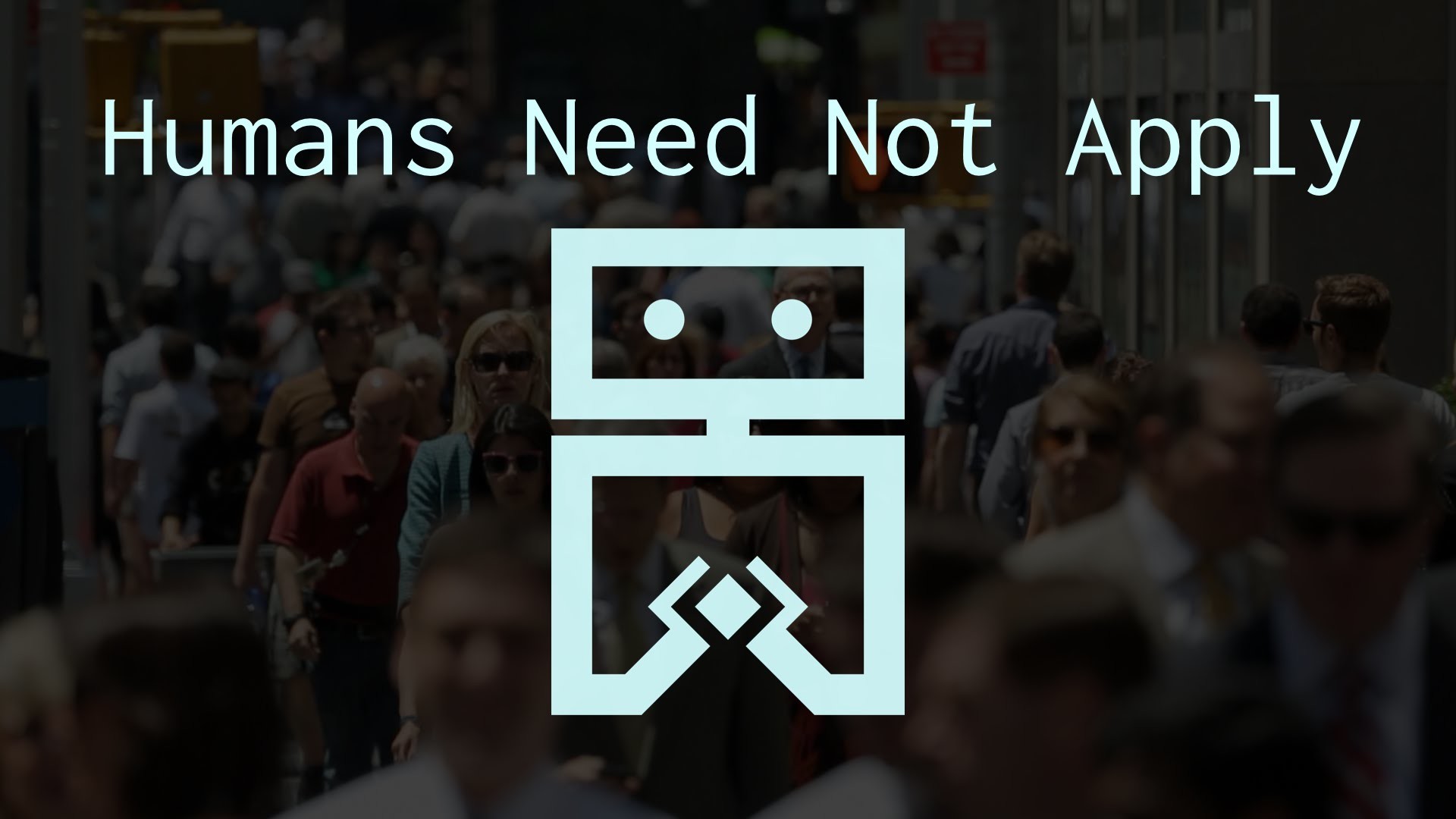 200 years ago, 70% of Americans worked on the farm. Today automation has eliminated 99% of their jobs, replacing them with machines. But the displaced workers did not sit idle. Instead, automation created hundreds of millions of jobs in entirely new fields. Our human assignment will be to keep making jobs for AI — and that is a task that will never be finished. So we will always have at least that one “job.”
200 years ago, 70% of Americans worked on the farm. Today automation has eliminated 99% of their jobs, replacing them with machines. But the displaced workers did not sit idle. Instead, automation created hundreds of millions of jobs in entirely new fields. Our human assignment will be to keep making jobs for AI — and that is a task that will never be finished. So we will always have at least that one “job.”
TIP: How can you find ways to get AI to work for you? Don’t waste your time learning skills that AI will replace in a few years, focus on getting good at seeing opportunities and creating something AI can’t think of (yet).
3 – FLOWING
Unstoppable streams in real-time for everything. Atoms and bits are now flowing from creators to consumers who are themselves creators. We want things that flow, in time and space.
We are bathed in streams of notifications and updates. Our apps improve in a flow of upgrades. We’ve moved from daily mode to real time. If we message someone, we expect them to reply instantly. In order to operate in real time, everything has to flow. DVDs cannot be streamed, paperbacks cannot be linked.
The internet is the world’s largest copy machine. If something can be copied and it touches the internet, it will be copied. When copies are superabundant, they become worthless. What can’t be copied becomes scarce and valuable — brand, immediacy, personalization, interpretation, authenticity, accessibility, embodiment, patronage, discoverability.
Kelly’s Four Stages of Flowing that apply to all media:
- Fixed products requiring much expertise to create -> Free products with promiscuous copying -> Sharing products with stream of services from the cloud -> Becoming products with streams of powerful services that enable amateurs to create new products and categories.
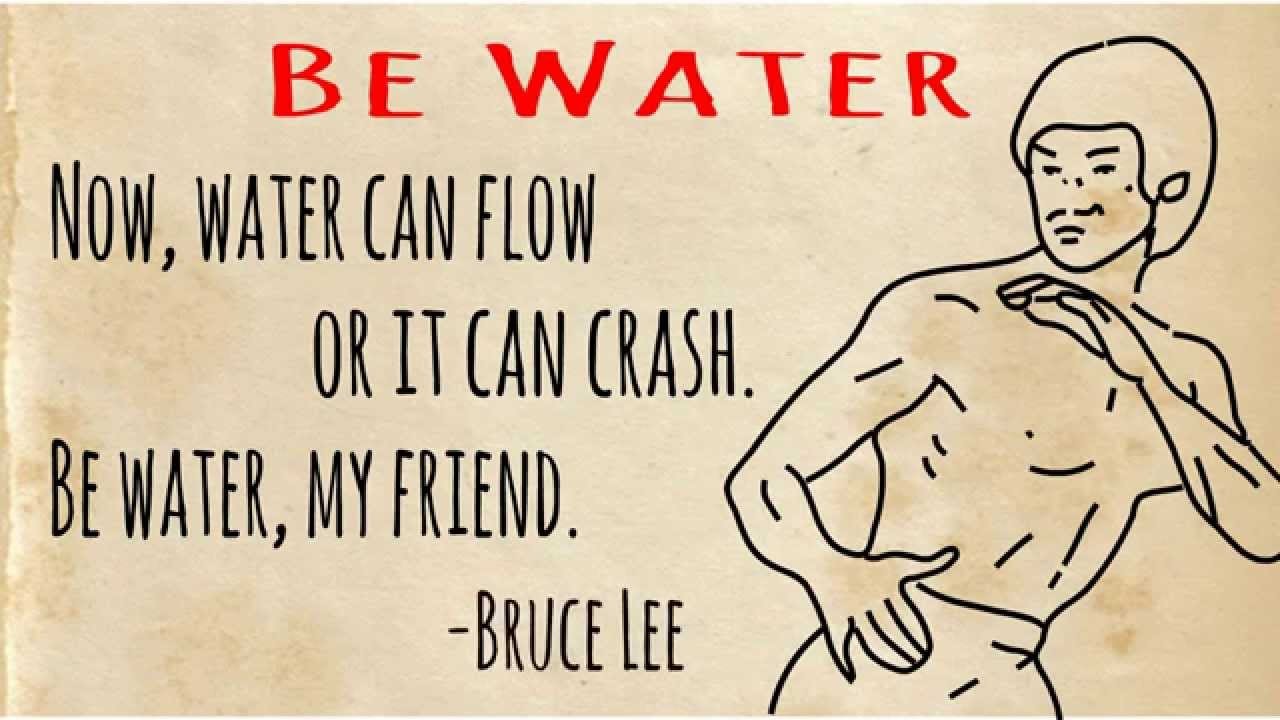 TIP: Don’t fight flow, it’s like trying to hold back a river. “You must be shapeless, formless, like water. When you pour water in a cup, it becomes the cup. When you pour water in a bottle, it becomes the bottle. When you pour water in a teapot, it becomes the teapot. Water can flow and it can crash. Be water my friend.” – Bruce Lee
TIP: Don’t fight flow, it’s like trying to hold back a river. “You must be shapeless, formless, like water. When you pour water in a cup, it becomes the cup. When you pour water in a bottle, it becomes the bottle. When you pour water in a teapot, it becomes the teapot. Water can flow and it can crash. Be water my friend.” – Bruce Lee
4 – SCREENING
We are turning all surfaces into screens to access content on the cloud that will become fluid, linked and tagged. As each word in each book and each frame in each video is cross-linked, clustered, cited, extracted, indexed, analyzed, annotated, and woven deeper into the culture than ever before.
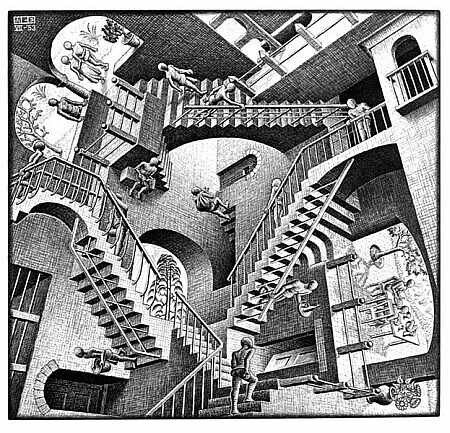 A complete universal library would contain the entire works of humankind, from the beginning of recorded history, in all languages. Over the next three decades, scholars and fans, aided by AI, will knit together the books and videos of the world into a single networked informational hub — think Wikipedia 2.0. We can have a clearer sense of what we as a civilisation know and what we don’t. That creates clarity for needed areas of new research rather than wasting time re-inventing the wheel.
A complete universal library would contain the entire works of humankind, from the beginning of recorded history, in all languages. Over the next three decades, scholars and fans, aided by AI, will knit together the books and videos of the world into a single networked informational hub — think Wikipedia 2.0. We can have a clearer sense of what we as a civilisation know and what we don’t. That creates clarity for needed areas of new research rather than wasting time re-inventing the wheel.
A new idea or unfamiliar fact uncovered while screening will provoke our reflex to do something. To research the term, to query your screen friends for their opinions, to find alternative views, to create a bookmark, to interact with or tweet the thing rather than simply contemplate it.
Screens provoke action instead of persuasion. Propaganda is less effective in a world of screens, because while misinformation travels as fast as electrons, corrections do too.
TIP: Instead of becoming a screen zombie, how can you use the screen as a means to interact? To create value?
5 – ACCESSING
We are shifting from owning assets to having access to services at all times. The availability of anything, atoms or bits, immediately without owning. Whatever you need you can get, and get the latest and best. Ownership is no longer necessary. In the coming 30 years there will be an acceleration towards dematerialized, decentralized, simultaneous, platform enabled, and the cloud.
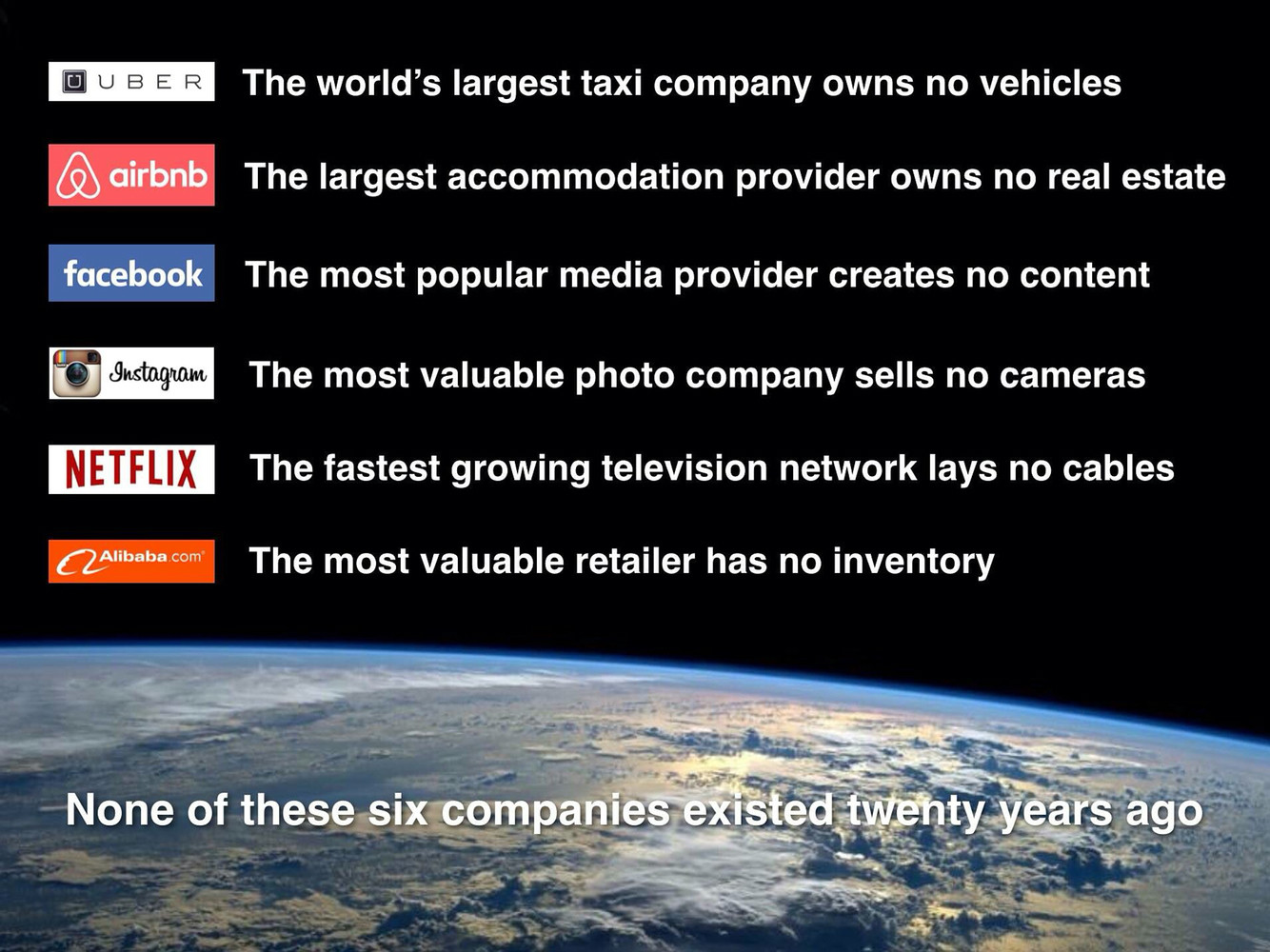
Dematerialized – The total amount of material we use per GDP dollar is going down, which means we use less material for greater value. Digital technology accelerates dematerialization by hastening the migration from products to services. In Silicon Valley they say “software eats everything.”
Decentralized – The more we embed intelligence and smarts into objects, the more we’ll treat these articles as social property. There is no need anymore to buy a car and drive yourself. You can hire a taxi, rent a car, hire a driver, carpool, and the options continue to expand.
Simultaneous – As more items are invented and manufactured we spend less and less time per item. The long-term trend in our modern lives is that most goods and services will be short-term use.
Platform Enabled – A platform is a foundation created by a firm that lets other firms build products and services upon it. It is neither market nor firm. As more is shared, less will act like property. It is not a coincidence that less privacy and more piracy are both breeding on platforms.
Cloud – The bulk of what you do on the web and phone today is done on cloud computing. Though invisible, clouds run our digital lives. The web is hyperlinked documents. The cloud is hyperlinked data. Ultimately the chief reason to put things onto the cloud is to share their data deeply.
TIP: Before buying or selling something, ask yourself, “What are the real benefits and disadvantages of ownership and would it be better to gain access instead?”
6 – SHARING
Kelly writes, “On my imaginary Sharing Meter Index we are still at 2 out of 10.” Collaboration is happening at mass-scale. Everyone creates and it’s all shared.
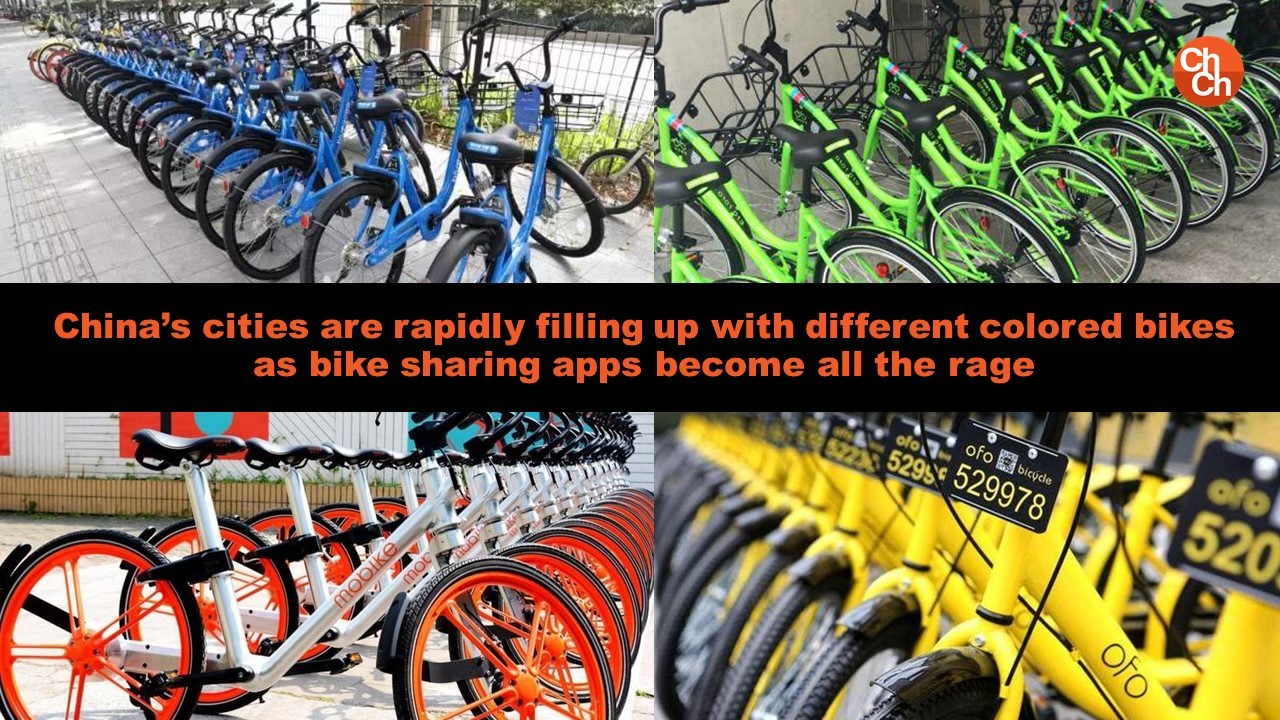 The goal of sharing technology is to maximize both the autonomy of the individual and the power of people working together. By far the most potent future role for crowdsharing is in fan base equity. Rather than invest into a product, supporters invest into a company.
The goal of sharing technology is to maximize both the autonomy of the individual and the power of people working together. By far the most potent future role for crowdsharing is in fan base equity. Rather than invest into a product, supporters invest into a company.
The largest, fastest growing, most profitable companies in 2047 will be companies that will have figured out how to harness aspects of sharing that are invisible and unappreciated today. Anything that can be shared — thoughts, emotions, money, health, time — will be shared in the right conditions, with the right benefits. Anything that can be shared can be shared better, faster, easier, longer, and in a million more ways than we currently realize.
TIP: What can you share that has not been shared before, or in a new way? It’s the surest way to increase its value.
7 – FILTERING
Attention is the scare resource. Allocating it to an exponentially expanding universe requires personalisation based on who we are. Future filters will both serve us and surprise us.
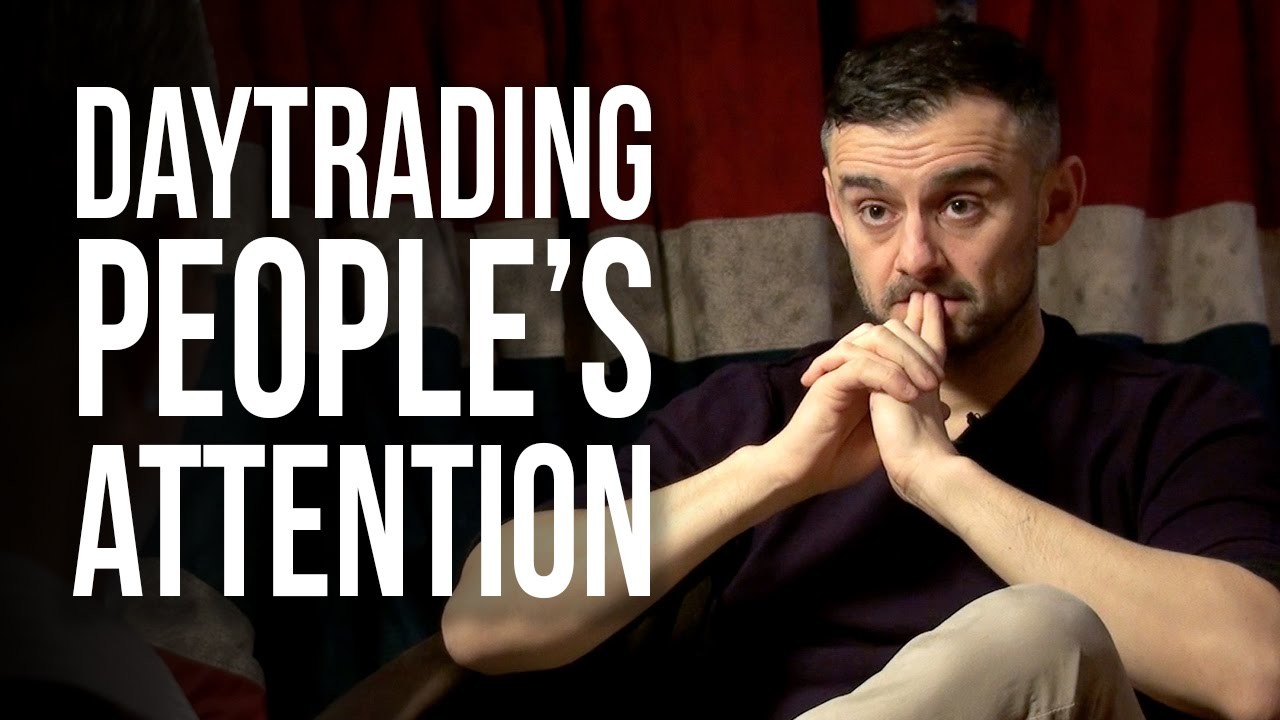
Close friends can make an echo chamber, amplifying the same choices. The ideal filter would include a stream that suggested stuff that I don’t like but would like to like. Every filter throws something good away. More filtering is inevitable because we can’t stop making new things.
The inadequacies of a filter cannot be remedied by eliminating filters but rather by applying countervailing filters upon it. “In a world of abundance, the only scarcity is human attention.” Since it is the last scarcity, wherever attention flows, money will follow.
TIP: What personalised experiences can you create for people? A major accelerant in this explosion of superabundance is the compounding cheapness of stuff. The only things that are increasing in cost while everything else heads to zero are human experiences — which cannot be copied.
8 – REMIXING
 Whatever is new is a remix of what exists. Remixing requires radical deconstruction and the ability to find the pieces to recombine and transform into something new.
Whatever is new is a remix of what exists. Remixing requires radical deconstruction and the ability to find the pieces to recombine and transform into something new.
Paul Romer, an economist at New York University, says real sustainable economic growth does not stem from new resources but from existing resources that are rearranged to make them more valuable. Growth comes from remixing.
If text literacy meant being able to parse and manipulate texts, then the new media fluency means being able to parse and manipulate moving images with the same ease. In a few years we’ll be able to routinely search video via AI.
In 30 years the most important cultural works and the most powerful mediums will be those that have been remixed the most.
TIP: What can you remix into experiences for people?
9 – INTERACTING
We will interact with our devices and with others in realistic virtual and augmented worlds. Our devices will ‘know’ us and we will know worlds and others through our devices.
 VR is getting more “realistic” faster than movies are. Within a decade, when you look into a state-of-the-art VR display, your eye will be fooled into thinking you are looking through a real window into a real world. But while realism will sell it, VR’s enduring benefits spring from its interactivity. The best demos of synthetic worlds are ones that trigger a deep realism not with the most pixels per inch, but with the most engagement of other people.
VR is getting more “realistic” faster than movies are. Within a decade, when you look into a state-of-the-art VR display, your eye will be fooled into thinking you are looking through a real window into a real world. But while realism will sell it, VR’s enduring benefits spring from its interactivity. The best demos of synthetic worlds are ones that trigger a deep realism not with the most pixels per inch, but with the most engagement of other people.
We are equipping our devices with senses so that we can interact with them. They will not only know we are there, they will know who is there and whether that person is in a good mood. The dumbest objects we can imagine today can be vastly improved by outfitting them with sensors and making them interactive.
The first technological platform to disrupt a society within the lifespan of a human individual was personal computers. Mobile phones were the second platform, and they revolutionized everything in only a few decades. The next disrupting platform is VR and it’s arriving fast.
TIP: How can you add more interaction to everything you do?
10 – TRACKING
Employing total surveillance for the benefit of citizens and consumers. We will track and be tracked everywhere and everywhen. What we track will expand exponentially and become extra senses
The design of the internet of everything is to track data. The 34 billion internet-enabled devices we expect to add to the cloud in the next five years are built to stream data. And the cloud is built to keep the data. Anything touching this cloud that is able to be tracked will be tracked.
 Copying is an issue for creators, because their stuff will be copied indiscriminately, often for free, when it was once rare and precious. Some people fight very hard against the bias to copy and some people work with the bias. Those who embrace the internet’s tendency to copy and seek value that can’t be easily copied tend to prosper, while those who try to thwart the network’s eagerness to copy are left behind to catch up later.
Copying is an issue for creators, because their stuff will be copied indiscriminately, often for free, when it was once rare and precious. Some people fight very hard against the bias to copy and some people work with the bias. Those who embrace the internet’s tendency to copy and seek value that can’t be easily copied tend to prosper, while those who try to thwart the network’s eagerness to copy are left behind to catch up later.
Ubiquitous surveillance is inevitable. Since we cannot stop the system from tracking, we can only make the relationships more symmetrical. There is a one-to-one correspondence between personalization and transparency. Absolute personalization (vanity) requires absolute transparency (no privacy).
TIP: What are you not tracking that you should start?
11 – QUESTIONING
Promoting good questions are far more valuable than good answers. Billions of connected people are creating a new level of organization where questioning is the norm and answers emerge from the collective. Unimagined questions beget unimaginable answers.
Wikipedia works because it turns out that, with the right tools, it is easier to restore damaged text (the revert function on Wikipedia) than to create damaged text (vandalism), and so the good enough article prospers and continues to slowly improve.
This waking dream we call the internet blurs the difference between serious thoughts and playful thoughts. Its getting harder and harder to know if we are working or playing. We need to be fluid and agile, flowing from idea to idea, because that fluidity reflects the turbulent informational environment surrounding us.
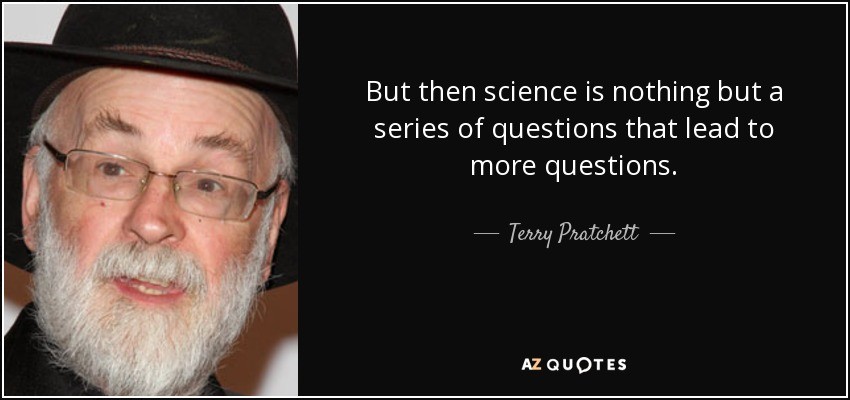 If knowledge is growing exponentially because of scientific tools, then we should be quickly running out of puzzles. But instead we keep discovering greater unknowns. Even though our knowledge is expanding exponentially, our questions are expanding exponentially faster. Answers become cheap and questions become valuable.
If knowledge is growing exponentially because of scientific tools, then we should be quickly running out of puzzles. But instead we keep discovering greater unknowns. Even though our knowledge is expanding exponentially, our questions are expanding exponentially faster. Answers become cheap and questions become valuable.
TIP: What is the most important question you can ask today? This week? This Year? This Century?
12 – BEGINNING
We are constructing a planetary system connecting all humans and machines into a global matrix. Now is the time in which, 30 years hence, people will look back and say, ‘that was the dawn of the era we are living in’. These forces will shape our future and we are only at the beginning.
At its core 7 billion humans, soon to be 9 billion, are quickly cloaking themselves with an always-on layer of connectivity that comes close to directly linking their brains to each other. We are in the Beginning of that process. In this new regime, old cultural forces, such as centralized authority and uniformity diminish while new cultural forces come to dominate our institutions and personal lives.
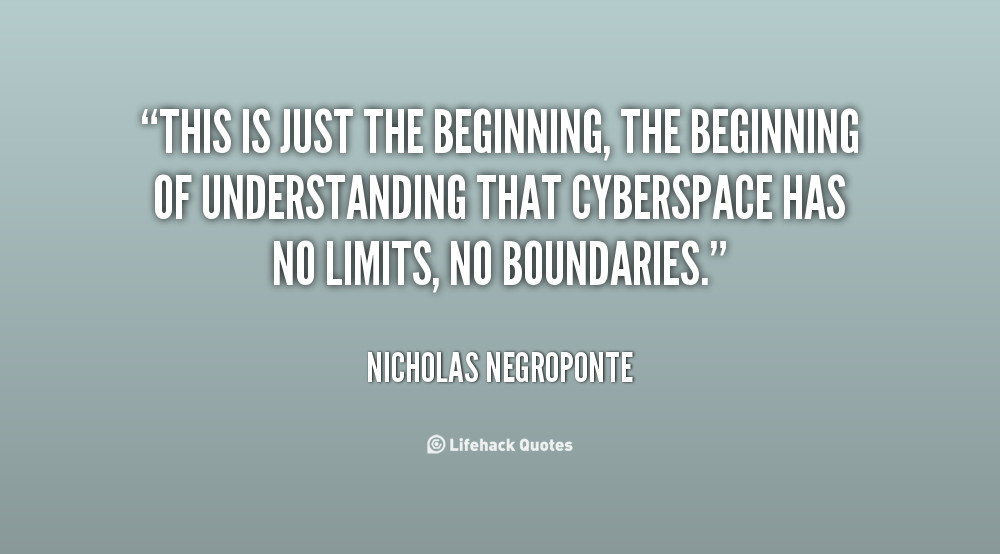 A soft singularity is more likely. In this future scenario AIs don’t get so smart that they enslave us. AI and robots and filtering and tracking and all the technologies converge and together we move to a complex interdependence. At this level many phenomenon occur at scales greater than our current lives, and greater than we can perceive — which is the mark of a singularity.
A soft singularity is more likely. In this future scenario AIs don’t get so smart that they enslave us. AI and robots and filtering and tracking and all the technologies converge and together we move to a complex interdependence. At this level many phenomenon occur at scales greater than our current lives, and greater than we can perceive — which is the mark of a singularity.
TIP: How can you continually live with a beginners mind, staying fresh and adaptable?
So what can you do with these trends?
“We are at the beginning of the beginning—the first hour of day one. There have never been more opportunities. The greatest products of the next 25 years have not been invented yet.”
 “You are not late.”
“You are not late.”
If you have an idea, but you are not sure how to get started reach out to me at fionn.wright@gmail.com and I’ll see if I might be able to help.
Hey You – Awesome Human!
I write about how we can reach our potential through conscious evolution – personal, social and planetary – and share tips, techniques and technologies you can use to live from a better space, make humans a better race and make the world a better place.
I hope you’ll join me on this journey by following me on LinkedIn here, and share with those who are also Awesome Humans.
I’m always interested in humans who care about making a difference, so connect with me here or visit fionnwright.com to book a trial session and inspire me with your Dream!
